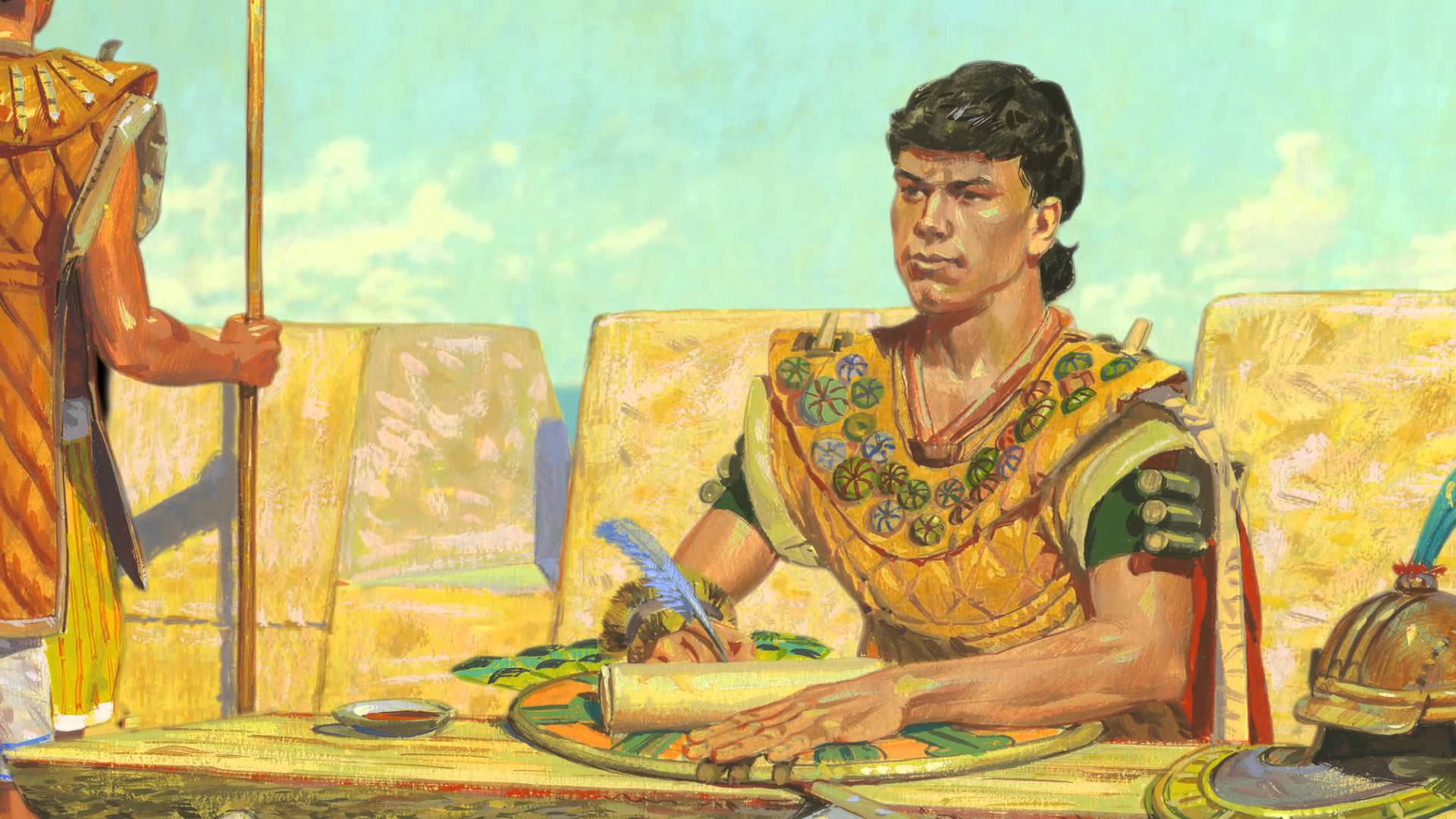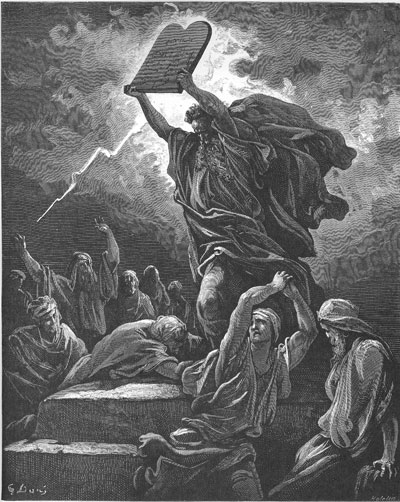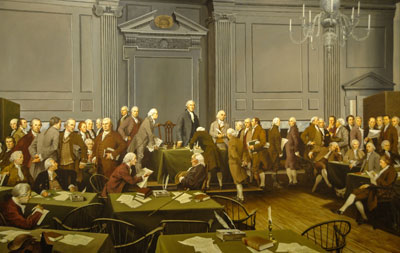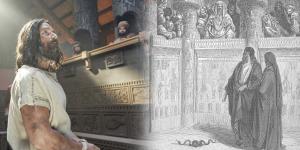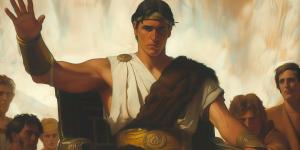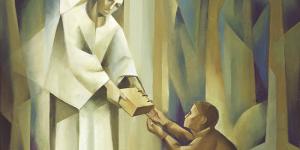You are here
Why Would Pahoran Not Allow the Law to Be Amended?

Alma 51:3
The Know
Soon after Pahoran had been appointed as the chief judge (Alma 50:39–40), the Book of Mormon reports that “there began to be a contention among the people … for behold, there were a part of the people who desired that a few particular points of the law should be altered” (Alma 51:2). These political activists were called king-men because they desired to “overthrow the free government and to establish a king over the land” (v. 5).
When “Pahoran would not alter nor suffer the law to be altered” (Alma 51:3), the king-men “were desirous that Pahoran should be dethroned from the judgment-seat” (v. 5). On the other hand, those who supported Pahoran “took upon them the name of freemen; and thus was the division among them, for the freemen had sworn or covenanted to maintain their rights and the privileges of their religion by a free government” (v. 6).
While modern societies typically view laws as provisional products of human creation, ancient civilizations often saw them as immutable decrees publically promulgated and sent forth by divinely appointed rulers.1 Moses, for example, received the Ten Commandments upon “tables of stone, written with the finger of God” (Exodus 31:18), which in turn were covenantally accepted by the people.2
That these divinely etched tablets were to be transported and memorialized in a sacred vessel, known as the ark of the covenant, only solidified their physical and symbolic permanence (see Exodus 25:10–16).3 Other ancient societies similarly wrote on non-perishable materials, such as stone or metal, in order to establish the durability of laws, treaties, or decrees.4
John W. Welch explained,
Accordingly, in the ancient world, law was much more than a matter of pragmatic policy or economic regulation. Law was an expression of the divine will, the highest ideals of a civilization, the necessary order of life, and the fundamental substance of justice and reality.5
Understanding that ancient peoples typically held their laws “in the highest esteem possible” may help explain why Pahoran and his freemen were so opposed to the king-men’s effort to alter the law.6
Furthermore, ancient law was typically perceived as a binding component of a covenantal relationship.7 The stated reason for the freemen’s support for retaining their current law was that they had “sworn or covenanted to maintain their rights and the privileges of their religion” (Alma 51:6). This likely refers most directly to their covenant to uphold Moroni’s title of liberty (Alma 46:19–21),8 but it also may reflect an earlier commitment to support the laws and government Mosiah established (Mosiah 29:37–39).9
The Why
Recognizing that legal statutes in the ancient world were often seen as permanent, divinely inspired, and covenant-related can help readers better contextualize the political factionalism found in Alma 51. This dispute was about far more than a suggested alteration of legal minutiae. Rather, the king-men’s radical proposal to reverse King Mosiah’s inspired system of judges would have encroached upon both political and religious fundamental norms and freedoms.
Unfortunately, the modern world faces similar threats to culturally crucial and religiously sacred freedoms. Elder D. Todd Christofferson concluded:
My friends and fellow citizens, we live in challenging times. Religious freedom is indeed under fire. And things may get worse before they get better. But these are our times. This is our moment to defend our fundamental freedoms. With courage, conviction, and civility … each one of us can make a profound difference.10
In their perilous circumstances, and in the context of ancient laws associated with religious covenants, Moroni was granted legal permission from the governor and the voice of the people “to compel those dissenters” to carry out their legal obligation “to defend their country,” (Alma 51:15).11 When those dissenters “did lift up their weapons of war to fight against the men of Moroni” (v. 18), many were killed but the rest were given a choice, either to simply yield “to the standard of liberty” (v. 20) or to be held in long-term prison under threat of death until eventually there would be time for their trials (v. 19).
Thankfully, our modern circumstances—although requiring no less boldness—call for civility and patience rather than force or compulsion, and in most places in the world we have the fortunate luxuries of time and resources to be able to respect human rights and constitutional protections. Thus, all people are encouraged “to teach and defend eternal truth in the way that our Heavenly Father desires, while at the same time exemplifying the respect, compassion, and deep love that Christ exemplified.”12
Modern Latter-day Saints and patriots of other faiths see the established laws, rights, and duties of the United States Constitution, as well as many other similarly modeled constitutions or freedom-enabling governments, as being divinely inspired and consonant with God’s will (see D&C 101:76–80).13 While legal changes can and must occur in all societies, those modifications do not justifiably occur by civil disobedience and political opportunism. Therefore, like the freemen in Pahoran’s day, all people who are so benefited are similarly and naturally obligated to defend their fundamental rights and privileges by following the guidance of patriotic leaders in carrying out the righteous will of the “voice of the people” (Alma 51:7).
Further Reading
John W. Welch, The Legal Cases in the Book of Mormon (Provo UT: BYU Press and Neal A. Maxwell Institute for Religious Scholarship, 2008), 3–18.
RoseAnn Benson and Stephen D. Ricks, “Treaties and Covenants: Ancient Near Eastern Legal Terminology in the Book of Mormon,” Journal of Book of Mormon Studies 14, no. 1 (2005): 48–61, 128–29.
John A. Tvedtnes, The Book of Mormon and Other Hidden Books: Out of Darkness Unto Light (Provo UT: FARMS, 2000).
- 1. See John W. Welch, The Legal Cases in the Book of Mormon (Provo UT: BYU Press and Neal A. Maxwell Institute for Religious Scholarship, 2008), 12–13; Noel B. Reynolds, “Nephite Kingship Reconsidered,” in Mormons, Scripture, and the Ancient World: Studies in Honor of John L. Sorenson, ed. Davis Bitten (Provo UT: FARMS, 1998), 151–189; Jeffrey M. Bradshaw and Ronan James Head, “The Investiture Panel at Mari and Rituals of Divine Kingship in the Ancient Near East,” Studies in the Bible and Antiquity 4 (2012): 1–2, 25–28; Brant A. Gardner, Traditions of the Fathers: The Book of Mormon as History (Salt Lake City, UT: Greg Kofford Books, 2015), 267–268; Stephen Houston and David Stuart, “Of Gods, Glyphs and Kings: Divinity and Rulership among the Classic Maya,” Antiquity 70, no. 268 (1996): 289–312; See also Book of Mormon Central, “What Did It Mean to Be ‘King Over All The Land’? (Alma 20:8),” KnoWhy 128 (June 23, 2016).
- 2. For other examples of writing delivered by the hand of the Lord, see Alma 10:2 and Daniel 5:5, 24–28.
- 3. See John A. Tvedtnes, The Book of Mormon and Other Hidden Books: Out of Darkness Unto Light (Provo UT: FARMS, 2000), 33–35; H. Curtis Wright, “Ancient Burials of Metal Documents in Stone Boxes,” in By Study and Also by Faith: Essays in Honor of Hugh W. Nibley, vol. 2, ed. John M. Lundquist and Stephen D. Ricks (Salt Lake City and Provo UT: Deseret Book and FARMS, 1990), 273–334. For a correlation between the ark of the covenant and the sacred relics among the Nephites, see Don Bradley, “Piercing the Veil: Temple Worship in the Lost 116 Pages,” 2012 FairMormon Conference presentation.
- 4. See William J. Hamblin, “Sacred Writing on Metal Plates in the Ancient Mediterranean,” FARMS Review 19, no. 1 (2007): 37–54; Tvedtnes, Book of Mormon and Other Hidden Books, 145–154.
- 5. Welch, Legal Cases, 13.
- 6. Welch, Legal Cases, 13. For a more nuanced awareness of Nephite legal terminology, see John W. Welch, “Statutes, Judgments, Ordinances, and Commandments,” in Reexploring the Book of Mormon: A Decade of New Research, ed. John W. Welch (Salt Lake City and Prove UT: Deseret Book and FARMS, 1992), 62–65.
- 7. See RoseAnn Benson and Stephen D. Ricks, “Treaties and Covenants: Ancient Near Eastern Legal Terminology in the Book of Mormon,” Journal of Book of Mormon Studies 14, no. 1 (2005): 48–61, 128–29; Stephen D. Ricks, “Kingship, Coronation, and Covenant in Mosiah 1–6,” in King Benjamin’s Speech: “That Ye May Learn Wisdom,” ed. John W. Welch and Stephen D. Ricks (Provo UT: FARMS, 1998), 233–275.
- 8. See Book of Mormon Central, “Why Did Moroni Quote the Patriarch Jacob about a Piece of Joseph’s Coat? (Alma 46:24),” KnoWhy 154 (July 29, 2016).
- 9. See Book of Mormon Central, “How Were Judges Elected In The Book Of Mormon? (Mosiah 29:39),” KnoWhy 107 (May 25, 2016).
- 10. D. Todd Christofferson, “Religious Freedom—A Cherished Heritage to Defend,” a Freedom Festival speech, June 26, 2016, online at lds.org.
- 11. Mormon’s appraisal of Moroni’s actions in this situation is clearly approving (see Alma 51:15–21). See Book of Mormon Central, “Why Did Mormon See Captain Moroni as a Hero? (Alma 48:17),” KnoWhy 155 (August 1, 2016). See also Ryan W. Davis, “For the Peace of the People: War and Democracy in the Book of Mormon,” Journal of Book of Mormon Studies 16, no. 1 (2007): 47: “Leaders like Moroni and Pahoran do not gain power arbitrarily. Rather, they have authority; their ability to use power is invested to them by a larger set of people (see Alma 43:17; 46:34). When kings rule without electoral consent, they may make war for personal reasons or for the benefit of a boisterous or influential minority.”
- 12. Von G. Keetch, “An Example of the Believers,” BYU-Idaho Devotional, June 14, 2016, online at byui.edu. For more information about the dramatized video presentation that Elder Keetch used in his address, see “Video Series Helps Mormons Defend Religious Freedom While Respecting Differences,” accessed July 7, 2016 at mormonnewsroom.org.
- 13. For the church’s declaration of beliefs regarding government and law, see D&C 134. See also Spencer W. McBride, “’Of Governments and Laws,’” Revelations in Context (2015), online at lds.org.
KnoWhy Citation
Related KnoWhys
Subscribe
Get the latest updates on Book of Mormon topics and research for free

